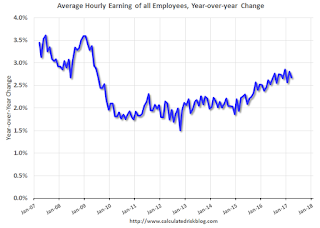The headline jobs number was below expectations, and there were combined downward revisions to the previous two months. However the weakness in the headline jobs number can be blamed on the weather (both payback from a warm February, and storms during the reference week in March).
Note: The weather impact was no surprise (I took the under in my employment preview).
There was plenty of good news – especially with the unemployment rate falling to 4.5% (with the participation rate steady), and wages picking up. Overall this was mostly a solid report.
Earlier: March Employment Report: 98,000 Jobs, 4.5% Unemployment Rate
In March, the year-over-year change was 2.13 million jobs. Decent job growth.
Average Hourly Earnings

This graph is based on “Average Hourly Earnings” from the Current Employment Statistics (CES) (aka “Establishment”) monthly employment report. Note: There are also two quarterly sources for earnings data: 1) “Hourly Compensation,” from the BLS’s Productivity and Costs; and 2) the Employment Cost Index which includes wage/salary and benefit compensation.
The graph shows the nominal year-over-year change in “Average Hourly Earnings” for all private employees. Nominal wage growth was at 2.7% YoY in March.
Wage growth is trending up.
Employment-Population Ratio, 25 to 54 years old

In the earlier period the participation rate for this group was trending up as women joined the labor force. Since the early ’90s, the participation rate moved more sideways, with a downward drift starting around ’00 – and with ups and downs related to the business cycle.
The 25 to 54 participation rate was unchanged in March at 81.7%, and the 25 to 54 employment population ratio increase to 78.5%.
The participation rate has been trending down for this group since the late ’90s, however, with more younger workers (and fewer older workers), the participation rate might move up some more.
Part Time for Economic Reasons

The number of persons employed part time for economic reasons (sometimes referred to as involuntary part-time workers), at 5.6 million, was little changed in March but was down by 567,000 over the year. These individuals, who would have preferred full-time employment, were working part time because their hours had been cut back or because they were unable to find full-time jobs.
The number of persons working part time for economic reasons decreased in March. The number working part time for economic reasons suggests a little slack still in the labor market. This is the lowest level since May 2008.
These workers are included in the alternate measure of labor underutilization (U-6) that decreased to 8.9% in March. This is the lowest level for U-6 since December 2007.
Unemployed over 26 Weeks

According to the BLS, there are 1.69 million workers who have been unemployed for more than 26 weeks and still want a job. This was down from 1.80 million in February.
This was the lowest number since 2008.
This is generally trending down, but still somewhat elevated.
Overall this was mostly a solid report.
comment-a-mostly-solid-employment-report

No comments:
Post a Comment